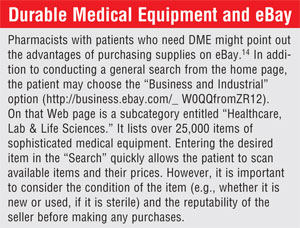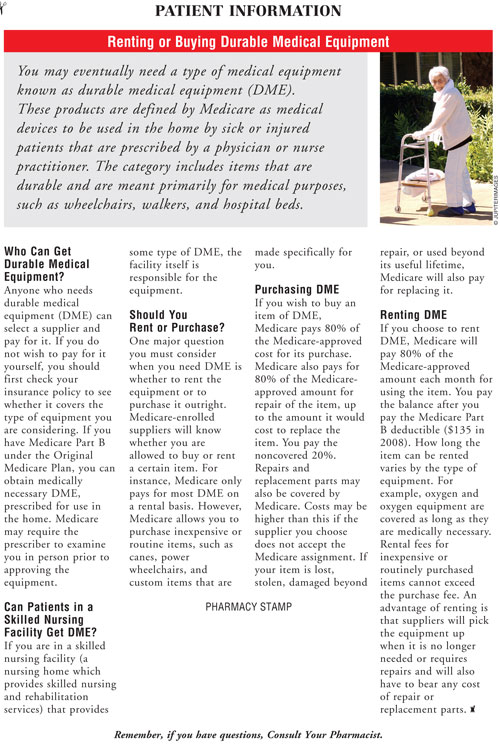US Pharm. 2008;33(6):10-15.
Providing durable medical
equipment (DME) can develop into a lucrative and rewarding aspect of a
pharmacy's total patient care role. Pharmacies deciding to supply DME should
explore the benefits of enrollment in Medicare, which is administered by the
Centers for Medicare & Medicaid Services (CMS), working in conjunction with
other contractors.1 Legislation determines program requirements,
and various regulations and directives clarify the details. Medicare Part B is
the section that concerns DME.
While not mandatory, pharmacy
enrollment will enable Medicare-covered patients to realize the full benefits
of their coverage. Should a Medicare patient purchase or rent DME from a
pharmacy not enrolled in Medicare, the government program will not pay the
claim.2
Becoming a DME Supplier
A pharmacy wishing
to become a DME supplier to Medicare patients must first apply by completing
Form CMS-855S (www.cms.hhs.gov/cmsforms/downloads/cms855s.pdf) for all
prospective suppliers of Durable Medical Equipment, Prosthetics, Orthotics,
and Supplies (DMEPOS).3 After the form with supporting
documentation is submitted, it will be processed by the National Supplier
Clearinghouse (NSC) to verify all information. A site visit will be scheduled
to verify compliance with DMEPOS Supplier Standards, as set forth in 42 CFR
424.57 (http://edocket.access.gpo.gov/cfr_2002/octqtr/pdf/42cfr424.57.pdf).
Accepting Assignment
Pharmacies may ease
the burden on their patients by accepting assignment. Assignment is an
agreement between the pharmacy and the patient that it will accept the
Medicare-approved amount as full payment. After the patient has paid the part
B deductible ($135 for 2008), the pharmacy accepting assignment can only
collect the coinsurance (usually 20% of the approved amount).1
Pharmacies that make this decision are known as participating suppliers.
If the pharmacy is enrolled in Medicare but chooses not to be a participating
supplier, it has the option of whether or not to accept assignment. In theory,
there is no limit to the amount that pharmacies can charge when they refuse to
accept assignment. For this reason, it is incumbent on the nonparticipating
pharmacy to make all costs clear in the form of a contract.
DME Covered by Medicare
Patients with
questions about Medicare and DME coverage may call 800-633-4227 for
clarification (877-486-2048 for TTY [hearing impaired] users).1 For
covered equipment, the patient generally pays 20% of the Medicare-approved
amount after meeting the 2008 deductible of $135. Medicare-covered DME
includes air-fluidized beds, blood glucose monitors, osteogenesis stimulators
(a Certificate of Medical Necessity [CMN] is required), canes, commode chairs,
crutches, home oxygen equipment and supplies (CMN required), hospital beds,
infusion pumps, nebulizers, scooters, suction pumps, traction equipment,
transcutaneous electronic nerve stimulators (CMN required), walkers,
wheelchairs, braces, breast prostheses, and ostomy supplies.1
Do Chronically Disabled
Elderly Underuse DME?
Pharmacies can be
more aggressive in promoting the use of DME to patients with severe
disability. A severe disability is one that requires an assistive device or
presents trouble with at least one activity of daily living.4 As
many as 30% to 54% of those over 65 years have such a disability.4
An estimated 75% to 90% of disabled elderly living in the community require
some type of assistive technology.5 Wheelchairs and braces are
required by 1.5 million elderly patients not living in institutions.4
Researchers examined a group
of 4,687 noninstitutionalized elderly Medicare enrollees (average age of 75.6
years).4 Many met the given definitions of disability, yet very few
made use of their DME benefit under Medicare. This finding held true for the
chronically disabled and for those with a disability of recent onset. This
finding is borne out by the fact that over half of patients aged 65 and above
who require assistive devices spend their own funds to obtain them.5

The Controversy Over Power
Mobility Devices
Medicare has long
been the target of fraud and theft. Pharmacies contemplating entry into the
DME market must protect themselves against any hint of fraudulent activity.
The official booklet from CMS contains an interesting statement: "Most
suppliers who work with Medicare are honest. There are a few who aren't
honest. Medicare is working with other government agencies to protect you and
the Medicare Program from dishonest suppliers of power wheelchairs and
scooters."1 This brief statement is a distillation of a major
controversy surrounding the use of two types of power mobility devices (PMDs):
power wheelchairs and power-operated vehicles.6
The Department of Justice
(DOJ) discussed a 2007 settlement with a leading PMD supplier that promised in
its advertisements to give applicants a power chair or scooter "absolutely
free" if they completed the company's program.7,8 The
DOJ alleged that the company violated the civil False Claims Act and defrauded
the United States. Allegedly, the company engaged in an attractive multimedia
campaign that enticed consumers to obtain power scooters paid for by Medicare,
Medicaid, and other insurers.8 However, the consumer did not
receive the "zippy" power scooters that were the focus of the advertisements.
Instead, the company sold beneficiaries expensive power wheelchairs. The
recipients did not want those devices, did not need them, and/or could not use
them. The company allegedly accomplished this by representing to physicians
that the patients desired and needed power wheelchairs. The duped physicians
filled out thousands of CMN forms, not knowing that they were doing so by
means of fraudulent practices.
The company allegedly billed
government and private health care insurers for the power wheelchairs and
fraudulently collected millions of Medicaid/ Medicare dollars, since the
devices are far more costly than power scooters. Power wheelchairs are
reimbursed at a rate of $5,000 to $7,000, while power scooters are only
reimbursed at $1,500 to $2,000. In addition, many patients were not told about
the switch until they received the equipment and discovered it to be far
removed from what they had envisioned.8
The DOJ also alleged that the
company billed Medicare for new equipment but actually sold used devices, and
that it charged Medicare millions of dollars for unnecessary power mobility
accessories. The company agreed to settle the allegations by paying $4 million
to the U.S. and also by giving up $13 to $43 million dollars in pending claims.
8 A whistleblower, who was a former employee, received over $3 million
of the settlement as a statutory award. The Assistant Attorney General stated,
"Equipment suppliers whose practices violate the law need to know that we are
dedicated to protecting Medicare funds and beneficiaries from their fraudulent
schemes." There have been many other instances.9-11
New Competitive Bidding
Program
On May 1, 2006, CMS
published a proposed rule in the Federal Register to alter the method
by which Medicare pays pharmacies and other suppliers by implementing a
competitive bidding process for certain covered items of DMEPOS.12
The purpose was stated as: "Competitive bidding provides a way to harness
marketplace dynamics to create incentives for suppliers to provide quality
items in an efficient manner and at reasonable cost to the program." CMS hoped
that the new program might "reduce the amount Medicare pays for DMEPOS and
create a payment structure under competitive bidding that is more reflective
of a competitive market."13 CMS explained its intention to
phase in competitive bidding gradually, perhaps first including those products
with the greatest potential for savings. Some of the most expensive items, in
decreasing order, were oxygen concentrators, power wheelchairs with
programmable features, blood glucose reagent strips (a expense of almost $800
million yearly), semi-electric hospital beds, portable gaseous oxygen
equipment, enteral formulas, enteral feeding kits, lancets, and nebulizers.
On April 10, 2007, CMS
published its Final Rule on the competitive bidding proposal.13 The
agency discussed the 2,129 comments it had received on the proposed rule.
Despite many comments disagreeing with certain provisions of the proposed
rule, CMS finalized the rule and planned for its implementation. Beginning
July 1, 2008, CMS will implement the new Competitive Bidding Program in
specific geographic areas. The first phase of the program will affect
pharmacies and other suppliers in: Charlotte-Gastonia-Concord (North and South
Carolina); Cincinnati-Middletown (Ohio, Kentucky, Indiana);
Cleveland-Elyria-Mentor (Ohio); Dallas-Fort Worth-Arlington (Texas); Kansas
City (Missouri, Kansas); Miami-Fort Lauderdale-Miami Beach (Florida); Orlando
(Florida); Pittsburgh (Pennsylvania); Riverside-San Bernardino-Ontario
(California); and San Juan-Caguas-Guaynabo (Puerto Rico).1
Suppliers who are unsure whether their zip code is included in the new
Competitive Bidding Program may call 1-800-MEDICARE. Information on the new
program is also available at www.medicare.gov.
Being Trained in DME
As can be seen by
this discussion, a major consideration in supplying DME is ensuring compliance
with Medicare regulations. There are many other considerations, however. The
pharmacists and staff involved in the practice should obtain training to
understand the various difficulties involved in DME sales. The manufacturers
often have sophisticated educational programs in place. If the pharmacy
proposes to enter the ostomy market, for instance, it is recommended that the
manufacturers of these products be contacted to ascertain the various
educational efforts that are already available. With appropriate training,
this potentially lucrative area can allow the pharmacy DME supplier to assume
an enhanced role in the community.

REFERENCES
1. Medicare
Coverage of Durable Medical Equipment and Other Devices. Baltimore, MD:
Centers for Medicare & Medicaid Services; 2007.
2. Johnson PE. Changes
in reimbursement rates and rules associated with the Medicare Prescription
Drug Improvement and Modernization Act. Introduction. Am J Health Syst
Pharm. 2006; 63(suppl 7):S2-S6.
3. Medicare
Enrollment for Durable Medical Equipment, Prosthetics, Orthotics, and Supplies
(DMEPOS) Suppliers. Baltimore, MD: Centers for Medicare & Medicaid
Services; 2006.
4. Iwashyna TJ,
Christie JD. Low use of durable medical equipment by chronically disabled
elderly. J Pain Symptom Manage. 2007;33:324-330.
5. Wolff JL, Agree EM,
Kasper JD. Wheelchairs, walkers, and canes: what does Medicare pay for, and
who benefits? Health Aff. 2005;24:1140-1149.
6. Medicare Coverage
of Power Mobility Devices (PMDs): Power Wheelchairs and Power Operated
Vehicles (POVs). Baltimore, MD: Centers for Medicare & Medicaid Services;
2007.
7. The Scooter Store
guaranteed freedom program.
www.thescooterstore.com/mobility/spur/ppc/14/defaultb.aspx. Accessed April 23,
2008.
8. The Scooter Store to
pay United States $4 million to resolve False Claims Act allegations.
Department of Justice. May 11, 2007.
www.usdoj.gov/opa/pr/2007/May/07_civ_344.html. Accessed April 23, 2008.
9. Doctors, others
indicted for Medicare fraud, money laundering. Office of the U.S.
Attorney-Western District of Missouri. January 4, 2006.
www.usdoj.gov/usao/mow/news2006/igbokwe.ind.pdf. Accessed April 23, 2008.
10. Houston man
investigated by Medicaid Fraud Control Unit receives 15 years in prison for
theft.
Attorney General of Texas. December 6, 2007.
www.oag.state.tx.us/oagnews/release.php?id=2293. Accessed April 23, 2008.
11. Nigerian national
sentenced for Medicare fraud. Office of the U.S. Attorney-Western District of
Missouri. February 21, 2007.
http://kansascity.fbi.gov/dojpressrel/pressrel07/medicarefraud022107.htm.
Accessed April 23, 2008.
12. Medicare program;
competitive acquisition for certain durable medical equipment, prosthetics,
orthotics, and supplies (DMEPOS) and other issues. Proposed rule. Fed Reg
. 2006;71:25654-25704.
13. Medicare program;
competitive acquisition for certain durable medical equipment, prosthetics,
orthotics, and supplies (DMEPOS) and other issues. Final rule. Fed Reg.
2007;72:17992-18090.
14. Lowes R. Need
equipment? Think eBay. Med Econ. 2005;82:27-28.
To comment on this article, contact
rdavidson@jobson.com.






